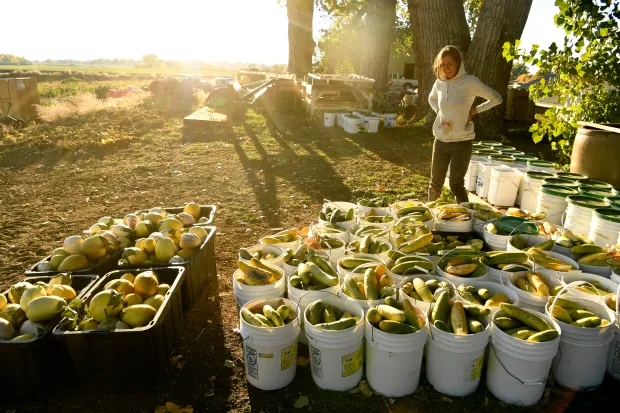It’s not enough to just grow one’s own produce anymore; the first step is in planning for foods that can grow in a changing climate starts with which seeds are harvested during years of adaptation.
“People are just beginning to learn more about not just who grows their food, but also which seeds do well as they adapt to inevitable climate changes,” said Laura Allard, operations manager at MASA Seed Foundation in Boulder.
Allard, along with Rich Pecoraro, who founded the MASA Seed Project initially and is its agricultural director, run this foundation that includes 24 acres of farmed land in east Boulder year-round. The mission of the foundation is to grow organic seeds that become part of a bio-regional seed bank.
“Our living seed bank belongs to future generations,” said Allard.
The MASA Seed Foundation is working with the Ecology and Evolutionary Biology Department at the University of Colorado Boulder. “It has been fascinating to see how important these aspects of biology are in this kind of farm,” said Nolan Kane, associate professor at the university. “CU is doing research and teaching involving sustainable agriculture, genetic, and plant biology at the farm in coordination with MASA.”
Kane explains that his students get a chance to witness how plant breeding and growing are done and how the classroom biology lessons really work out on an actual farm.
A visitor to MASA in east Boulder will initially see it as similar to neighboring farms, where they can pick up their Community Supported Agriculture (CSA) order or stop by the informal farm stand to purchase what’s in season: zucchinis, melons, green chiles, fresh flowers and more. Inside the white clapboard farmhouse at the farm’s edge is what sets it apart: Inside, it is set up as a seed store with jars of colorful corn, beans, herbs, flowers, squash, peppers and grains. A tour through the small rooms leads to massive barrels filled with years of carefully harvested seeds.
“The work being done at MASA is so important for supporting local gardens and farms,” said Kane. “Rich and others at MASA are focused on adapting plants to our unusual local conditions and providing seeds and plants that will do well here.”
He explains that the adaptation means that the seeds are harvested only from the plants that are thriving in the dry air, strong winds, high altitude, clay soil, and other specific conditions such as resistance to local insects and diseases. “Ultimately that improves local food production, food security, and food quality, as well as improving the local agricultural economy,” Kane explained.
Just like at other farms open to the public, this seed farm welcomes volunteers to help with the workload — both in the fields and administratively — and learn more about breeding seeds.
“During seed season, we have volunteers in the seed house where they can be cleaning and packing seeds from about November through February,” said Allard, “In the spring, we need help in the plant nursery to plant little seeds, thin plants and water. Then, in late April, we have an online sign-up so that we have a rotation of people all summer to plant, weed and cultivate.”
Of course, like at any farm, the fall months are a time of harvesting, and volunteers are welcome for those shifts as well.
The foundation also has a floristry department where volunteers are needed to make bouquets and some flowers are hung to dry out until their seeds are harvested. They also welcome people with administrative skills to assist with social media and marketing tasks.

If there isn’t time to volunteer, in the summer months they host pizza nights and farm dinners on-site when guests can learn more about the seeds that were harvested, planted and grew into the food they are eating. Local school kids often get tours of the farm, and some of the farm’s produce goes to nearby food banks.
Calling it a “farm-to-food bank” program, MASA works with low-income communities in the area to provide “nutrition-rich food.”
This is not Colorado’s only seed farm and there are other seed banks with their own regional climates being factored into what is harvested and saved.
Wild Mountain Seeds on Sunfire Ranch in Carbondale specializes in seeds that thrive in a high alpine environment. Like MASA, their seeds can be bought online for backyard gardeners to experiment with heirloom varieties of tomatoes, beans, melons, and vegetables.
Pueblo Seed & Feed Co. in Cortez grows “certified organic, open-pollinated seeds” that are selected for drought tolerance as well as taste. The company was based in Pueblo before relocating in 2021. This farm donates seed annually to the Traditional Native American Farmers Association.
High Desert Seed + Gardens in Paonia adapts seeds for the high desert climate and sells their seeds, including high desert quinoa, rainbow blue corn, Hopi red dye Amaranth, Italian Mountain basil, and much more online by the packet.

The key to successful seed farming, says Allard, is patience as these farmers must select the qualities they want in a food. “We manage without chemicals and plant with companions so the insects or pests are attracted to the calendula instead of the tomatoes, for example,” she said.
Allard is excited as she talks of trialing 65 kinds of lettuce and harvesting those that don’t wilt in the heat, as one of example of how plants are selected to be bred for optimum production in the future.
MASA and other seed farms in Colorado offer classes for those who want to learn more about the climate-resistant seeds they can grow at home, or a chance to visit their farm to help them do this important work.
“There is this, ‘Aha!’ for parents whose kids visit the farm and become interested in the future of the local food system,” said Allard. “This is seed education for them.”
Source : The Denver Post

